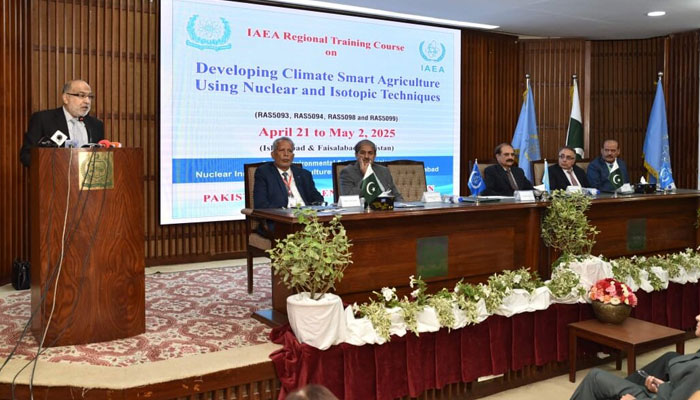Regional training on developing climate-smart agriculture begins
Islamabad:A 10-day regional training course on developing climate-smart agriculture using nuclear and isotopic techniques in Pakistan kicked off here at National Agricultural Research Centre (NARC) on Monday, says a press release.
The International Atomic Energy Agency (IAEA), in collaboration with the Government of Pakistan is organizing this course through the Pakistan Atomic Energy Commission (PAEC). The Nuclear Institute for Agriculture and Biology (NIAB), Faisalabad being the premier agriculture research institute of the PAEC is the organiser of the training course. The inaugural session was held at the NARC Auditorium.
Dr. Raja Ali Raza Anwar, Chairman of the Pakistan Atomic Energy Commission, was the chief guest on this occasion. He said, “I am delighted to be part of the regional training course. As Chairman of the Commission, two subjects are very close to my heart: one is Nuclear Medicine and the other is Agriculture. I am glad to see a distinguished gathering of scientists from around the world attending this training course. We often talk of climate change since we are among the most affected nations hit by this calamity. But if we don’t change our ways, our next generation will bear the brunt of it.”
Dr. Ali Raza further said, “Climate change is taking a heavy toll on our crops and their yields. If we fail to adopt modern techniques of agriculture like drip irrigation and don’t abolish conventional practices, research shows that our crop yields will go down 50% by 2050 in Pakistan.”
He added that seasons are changing and, owing to rising temperatures, we have recently witnessed the worst hailstorm in the capital, causing a lot of damage to vehicles and buildings. Growing trees can mitigate rising temperatures and reduce carbon emissions, he added.
“With support from the IAEA, we are engaged in several Technical Cooperation projects using nuclear techniques. This regional training course marks a milestone.” He also mentioned the contribution of PAEC in the generation of nuclear power, which is endorsed by the IAEA as an effective solution to mitigating climate change. He shared that, to date, PAEC’s six operational nuclear power plants have supplied 170 billion units to the national grid. Although the total installed capacity of these NPPs is just 7.7%, they have contributed as much as 25% of the total electricity produced by all sources in the energy mix during winters.
-
 Blac Chyna Reveals Her New Approach To Love, Healing After Recent Heartbreak
Blac Chyna Reveals Her New Approach To Love, Healing After Recent Heartbreak -
 Royal Family's Approach To Deal With Andrew Finally Revealed
Royal Family's Approach To Deal With Andrew Finally Revealed -
 Super Bowl Weekend Deals Blow To 'Melania' Documentary's Box Office
Super Bowl Weekend Deals Blow To 'Melania' Documentary's Box Office -
 Meghan Markle Shares Glitzy Clips From Fifteen Percent Pledge Gala
Meghan Markle Shares Glitzy Clips From Fifteen Percent Pledge Gala -
 Melissa Jon Hart Explains Rare Reason Behind Not Revisting Old Roles
Melissa Jon Hart Explains Rare Reason Behind Not Revisting Old Roles -
 Meghan Markle Eyeing On ‘Queen’ As Ultimate Goal
Meghan Markle Eyeing On ‘Queen’ As Ultimate Goal -
 Kate Middleton Insists She Would Never Undermine Queen Camilla
Kate Middleton Insists She Would Never Undermine Queen Camilla -
 Japan Elects Takaichi As First Woman Prime Minister After Sweeping Vote
Japan Elects Takaichi As First Woman Prime Minister After Sweeping Vote -
 King Charles 'terrified' Andrew's Scandal Will End His Reign
King Charles 'terrified' Andrew's Scandal Will End His Reign -
 Winter Olympics 2026: Lindsey Vonn’s Olympic Comeback Ends In Devastating Downhill Crash
Winter Olympics 2026: Lindsey Vonn’s Olympic Comeback Ends In Devastating Downhill Crash -
 Adrien Brody Opens Up About His Football Fandom Amid '2026 Super Bowl'
Adrien Brody Opens Up About His Football Fandom Amid '2026 Super Bowl' -
 Barbra Streisand's Obsession With Cloning Revealed
Barbra Streisand's Obsession With Cloning Revealed -
 What Did Olivia Colman Tell Her Husband About Her Gender?
What Did Olivia Colman Tell Her Husband About Her Gender? -
 'We Were Deceived': Noam Chomsky's Wife Regrets Epstein Association
'We Were Deceived': Noam Chomsky's Wife Regrets Epstein Association -
 Patriots' WAGs Slam Cardi B Amid Plans For Super Bowl Party: She Is 'attention-seeker'
Patriots' WAGs Slam Cardi B Amid Plans For Super Bowl Party: She Is 'attention-seeker' -
 Martha Stewart On Surviving Rigorous Times Amid Upcoming Memoir Release
Martha Stewart On Surviving Rigorous Times Amid Upcoming Memoir Release




